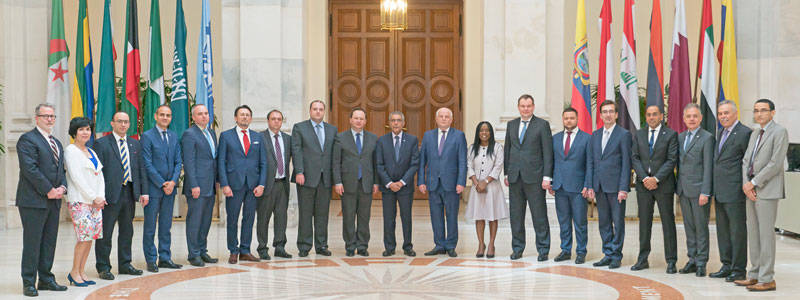We use Cookies. Read our Terms
- Media Center
- Press releases
- 2017
- OFID and Ukraine AEPI paves way for social and economic development
OFID and Ukraine AEPI paves way for social and economic development

An Agreement for the Encouragement and Protection of Investment (AEPI) has been signed between OFID and the Ukraine. The agreement, which sets the framework for commencing private sector operations in Ukraine, was signed by OFID Assistant Director-General Fuad Albassam, and First Vice Prime Minister—Minister of Economic Development and Trade of Ukraine, Stepan Kubiv.
Albassam said the agreement prepared the ground for OFID to help promote social and economic development within Ukraine by encouraging the growth of productive private enterprise and supporting the development of the private sector. “We are very pleased to begin what we see as a long and lasting relationship with Ukraine,” he said. “OFID’s Private Sector and Trade Finance Operations department represents an important instrument of development.”
Kubiv said that due to challenging circumstances, Ukraine had lost about 20 percent of its economy. “As a result, we’re witnessing social and economic problems,” he explained. “This agreement lays new foundations for cooperation between Ukraine and OFID. It is mutually beneficial as one of OFID’s mandates is rendering development assistance to states in circumstances such as ours. We have a concrete plan of action for the development of our economy and to improve living standards and this AEPI provides new impetus for investment activities and social recovery.”
Under OFID’s Private Sector Facility, established in 1998, 264 operations have been approved in support of private entities in Africa, Asia, Latin America and Europe. By the end of April 2017, US$2,937.9m had been committed and US$1,801.1m disbursed. In 2006, a Trade Financing Facility was launched. By the end of April 2017, US$2,786.6m in term loans had been committed and US$2,545.7m had been disbursed. In addition, US$2bn in risk-sharing guarantee programs had been approved.
OFID’s Private Sector Facility and Trade Financing Facility now form part of the same financing window under the leadership of Tareq Alnassar, Head, Private Sector and Trade Finance Operations. The window channels support directly to the private sector in developing countries. Loans are made to financial institutions for on-lending to small-, medium- and micro-enterprises, as well as directly to specific projects. Equity participation in private enterprises is also undertaken, either directly or through country or regional investment funds. As a pre-condition to such investment, OFID requires the signature of a framework agreement with the country concerned for the encouragement and protection of investment (AEPI). The agreement accords OFID the same privileges as those normally granted to international development institutions.
Kubiv explained how Ukraine is committed to continuing reform efforts, and a wide-ranging reform agenda is now being followed. “Ukraine is implementing the government strategy for 2020,” he said. “We have a concrete parliamentary program that outlines the necessary legislative changes for the development of the economy and society. We have already achieved a significant growth in GDP, which is now 2.3 percent versus minus 43 percent three years ago. These positive changes are underpinned by 140 laws adopted by parliament.
“These steps will change the face of Ukraine building trust and preventing corruption,” Kubiv continued. “Over the last year, investment has risen by 16 percent and we now have good prospects. Today’s agreement will strengthen Ukraine.”
The Ukraine initially reached out to OFID for support in 2015; a move Albassam said he appreciated. He also explained how he looked forward to working with Ukraine across all OFID’s finance mechanisms in support of the country’s development and in pursuit of the organization’s mandate: “OFID works in cooperation with low and middle income countries and the international donor community to stimulate economic growth and alleviate poverty in all disadvantaged regions of the world. To achieve this mission, OFID finances development projects or programs, particularly those that meet basic needs of our partner countries: such as infrastructure, food, energy, clean water and sanitation, healthcare and education.”